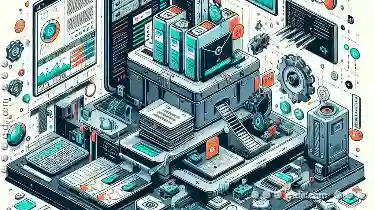Navigating through the digital landscape, we often find ourselves accumulating a myriad of favorites-websites that we visit frequently or hold dear. While ...
 this might seem like a great way to streamline access to our most used resources, it turns out that having too many favorite links can actually be detrimental to both mental health and productivity. Let's delve into why your brain dislikes overloaded favorites and how you can optimize your digital bookmarks for better cognitive functioning.
this might seem like a great way to streamline access to our most used resources, it turns out that having too many favorite links can actually be detrimental to both mental health and productivity. Let's delve into why your brain dislikes overloaded favorites and how you can optimize your digital bookmarks for better cognitive functioning.1. Understanding the Problem: Cognitive Load and Mental Clutter
2. The Impact of Cognitive Load on Performance
3. Organization Through Personalization: Tailoring Your Favorites
4. Embracing Minimalism in Digital Spaces
5. Conclusion: Finding Balance in Digital Organization
1.) Understanding the Problem: Cognitive Load and Mental Clutter
First off, let’s discuss what we mean by "overloaded favorites." This isn't just about having a large number of favorite links but also includes situations where these links are poorly organized or serve similar purposes. Both scenarios can lead to increased cognitive load-the mental strain required to keep information in memory.
When you have too many bookmarks, your brain has to work harder to find what it needs because the system is more complex than it would be with fewer choices. This added effort results in a higher demand on your working memory and processing power, leading to mental fatigue over time.
2.) The Impact of Cognitive Load on Performance
The human brain is not designed for multitasking or handling large amounts of information simultaneously. When cognitive load increases due to the presence of too many favorites, our brains become overwhelmed, potentially causing a decline in performance. This can manifest in several ways:
- Reduced Focus: Constantly searching through a cluttered list of bookmarks distracts your attention from the task at hand and can disrupt your workflow.
- Increased Stress: The effort required to navigate through multiple links can cause unnecessary stress, which may lead to frustration, especially if you're trying to find something specific quickly.
- Diminished Creativity: Excessive cognitive load has been linked with a decrease in creative thinking and problem-solving abilities as the brain is overtaxed and unable to think flexibly or abstractly.
3.) Organization Through Personalization: Tailoring Your Favorites
To alleviate this issue, consider personalizing your favorites based on frequency of use and content relevance. Here’s how you can do it:
1. Use Folder Structures
Group similar sites into folders to reduce the number of clicks required to reach a destination. This makes navigation much more efficient than having everything scattered across multiple pages.
2. Tagging and Labels
Assign tags or labels to your favorites based on content type (e.g., "work," "research," "entertainment" or relevance at the time of bookmarking. This way, you can quickly filter through your bookmarks based on context.
3. Regular Review and Cleanup
Just like physical clutter in a room, digital clutter benefits from regular decluttering. Periodically review your favorites list, remove any links that are no longer relevant or used, and add new ones if necessary to maintain an optimal cognitive load.
4.) Embracing Minimalism in Digital Spaces
Embracing minimalism can be a powerful tool for managing cognitive overload. Focus on keeping only the essential bookmarks and regularly pruning those that serve little purpose. This decluttering process not only reduces clutter but also helps clarify mental pathways, making it easier to focus on what truly matters.
5.) Conclusion: Finding Balance in Digital Organization
In conclusion, while adding a variety of favorite links can seem like a smart way to stay organized and efficiently manage digital content, the reality is that too much choice can lead to increased cognitive load and ultimately hinder productivity and mental well-being. By organizing your favorites with a balance between efficiency and minimalism, you can optimize your online experience for better focus, creativity, and stress reduction.
Remember, just as physical clutter in our living spaces can affect our mood and productivity, digital clutter in the form of an overcrowded bookmarks list can have similar effects on our mental space. By understanding these dynamics and implementing strategies to manage them effectively, you can enhance both your online experience and overall cognitive health.

The Autor: / 0 2025-05-18
Read also!
Page-

Why Tree View is Still the Best Way to Browse Files
From simple folders to complex cloud storage solutions, users are always looking for ways to efficiently navigate through their files and data. Among ...read more

Is "Move" Holding Back True Digital Efficiency?
The act of moving files and folders between directories is a common task that many users perform daily. However, it's essential to question whether ...read more

How Attributes Affect File Operations (Copy, Move, Delete)
Welcome to this comprehensive guide on how attributes affect file operations such as copy, move, and delete. Whether you are a beginner or an ...read more